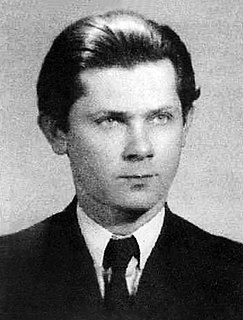A Quote by Zbigniew Herbert
I turn to history not for lessons but to confront my experience with the experience of others and to win for myself a sense of responsibility for the state of the human conscience.
Related Quotes
Direct experience is inherently too limited to form an adequate foundation either for theory or for application. At the best it produces an atmosphere that is of value in drying and hardening the structure of thought. The greater value of indirect experience lies in its greater variety and extent. History is universal experience, the experience not of another, but of many others under manifold conditions.
What experience and history teach is this - that nations and governments have never learned anything from history, or acted on any lessons they might have drawn from it. Variant: What experience and history teach is this - that people and governments never have learned anything from history, or acted on principles deduced from it.
There is a fundamental spiritual quality to gratitude that transcends religious traditions. Gratitude is a universal human experience that can seem to be either a random occurrence of grace or a chosen attitude to create a better experience of life; in many ways it contains elements of both. Grateful people sense that they are not separated from others or from God; this recognition of unity with all things brings a deep sense of gratefulness, whether we are religious or not.
Traditional religions practices are important.They allow us to share with others the communal experience of adoration and prayer,but we must never forget spiritual experience is above all a practical experience of love,and with love,there are no rules some may try to control their emotions and develop strategies for their behavior,others may turn to reading books of advice from "experts" on relationships but this is all folly.The heart decides and what it decides is all that really matters.
It's hard for writers to get on with their work if they are convinced that they owe a concrete debt to experience and cannot allow themselves the privilege of ranging freely through social classes and professional specialties. A certain pride in their own experience, perhaps a sense of the property rights of others in their experience, holds them back.
I say that creeds, dogmas, and theologies are inventions of the mind. It is the nature of the mind to make sense out of experience, to reduce the conglomerates of experience to units of comprehension which we call principles, or ideologies, or concepts. Religious experience is dynamic, fluid, effervescent, yeasty. But the mind can't handle these so it has to imprison religious experience in some way, get it bottled up. Then, when the experience quiets down, the mind draws a bead on it and extracts concepts, notions, dogmas, so that religious experience can make sense to the mind.







































